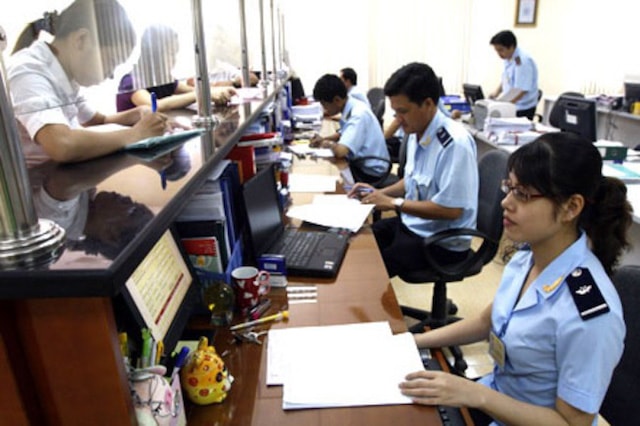From April 1, no cash is used to pay taxes and fees to Customs authorities.
Not only the payment of import and export taxes but also the collection and payment of customs fees and charges are completely cashless and must be collected and paid through credit institutions.
The General Department of Customs has just issued an official dispatch requesting provincial and municipal customs departments to, from April 1, 2019, guide enterprises to pay amounts to the State budget (including taxes, late payment fees, fines, fees, charges and other revenues) by non-cash payment (transfer) or cash payment at commercial banks, to be transferred to the Customs agency's account at the State Treasury.
Coordinate collection through commercial banks: Following the trend of not using cash
Promote cashless collection and disbursement through the State Treasury system
Time for cashless payments.
 |
Customs will not accept cash when businesses pay taxes and fees. |
Specifically, all economic units and organizations (according to Clause 16, Article 3 of the 2014 Investment Law, an economic organization is an organization established and operating in accordance with the provisions of Vietnamese law, including enterprises, cooperatives, cooperative unions and other organizations conducting investment and business activities) with accounts at commercial banks, if they have import-export activities and generate payments to the State budget (NSNN), must make payments to the State budget (including taxes, late payment fees, fines, fees, charges and other revenues) by non-cash payment (transfer) or cash payment at a commercial bank, to be transferred to the Customs agency's account at the State Treasury.
However, for individual and sole proprietorships that engage in import-export activities and incur payments to the State budget, they are not subject to the regulation of Circular No. 136/2018/TT-BTC dated December 28, 2018.
This instruction of the General Department of Customs is to implement the Government's policy of non-cash payment, and to implement Circular No. 136/2018/TT-BTC dated December 28, 2018 of the Ministry of Finance amending and supplementing a number of articles of Circular No. 13/2017/TT-BTC dated February 15, 2017 of the Ministry of Finance regulating the management of cash receipts and disbursements through the State Treasury system.
Accordingly, not only the payment of import-export taxes but also the collection and payment of customs fees and charges (currently both electronically and directly to the Customs authority) must not be made in cash and must be collected and paid through credit institutions.
To guide this regulation, the General Department of Customs has requested the provincial and municipal Customs Departments to direct the Customs Sub-Departments to publicly post Circular 136/2018/TT-BTC and this document at the headquarters of the Customs agency where customs procedures are carried out; widely notify economic organizations carrying out import-export procedures at the unit about the mandatory time to pay taxes, late payment fees, fines, fees, charges and other revenues by transfer at the State Treasury or commercial banks.
Along with that, request the Provincial and Municipal Customs Departments to organize and coordinate with the Commercial Bank Branches to coordinate collection, the State Treasury in the area to organize transaction points and collection points near the customs clearance locations to support businesses in carrying out import and export procedures for goods.
Regarding customs fees and charges, the provincial and municipal Customs Departments and Customs Branches guide enterprises to pay fees and charges monthly. In case enterprises need to pay according to each customs declaration, please guide them to pay customs fees and charges at the same time as paying taxes.

